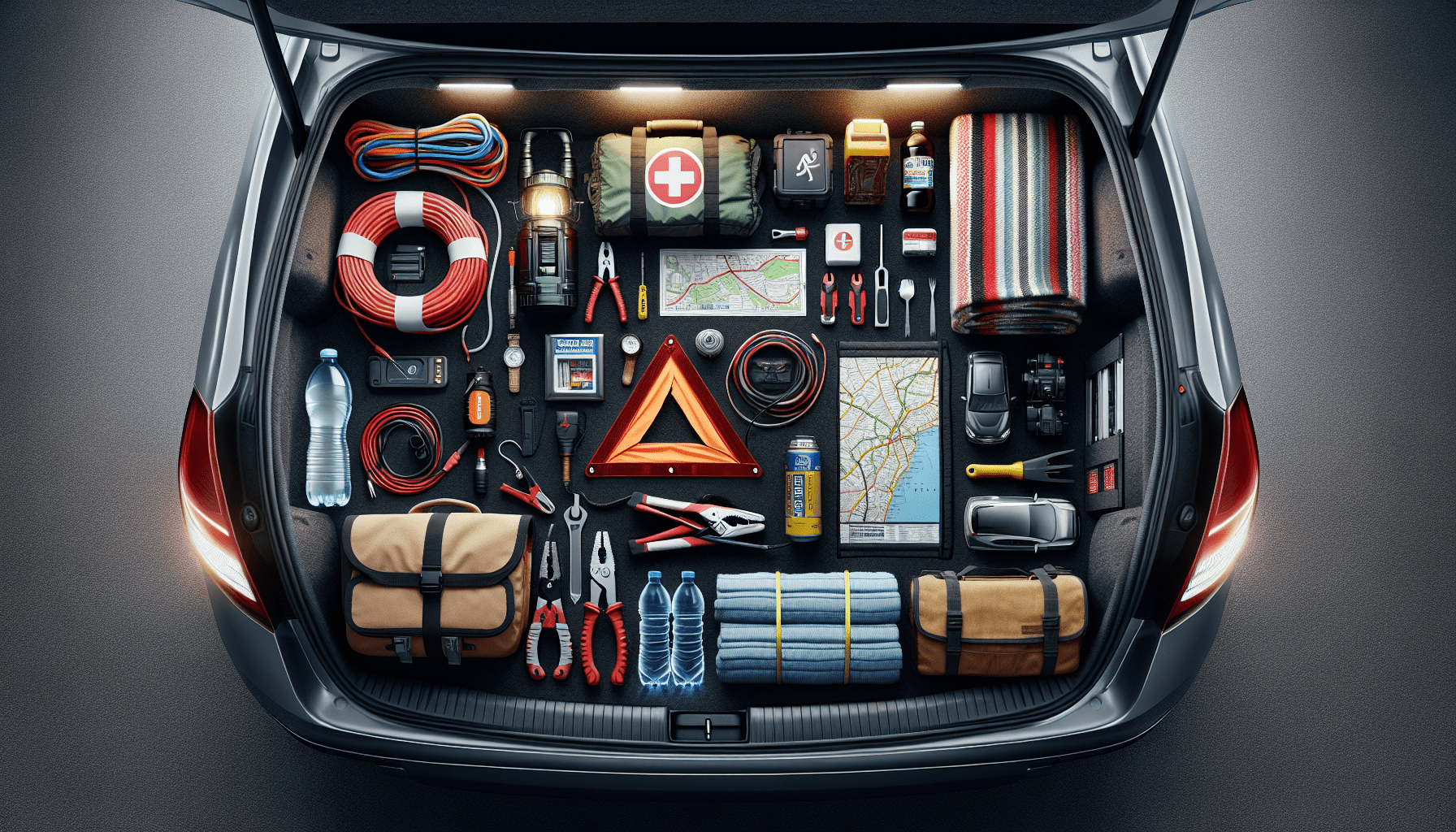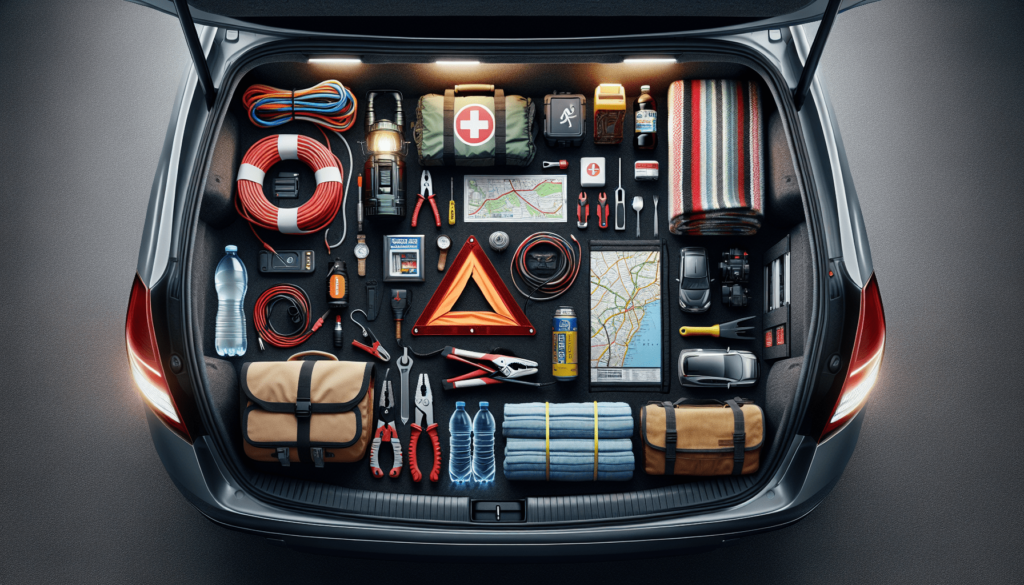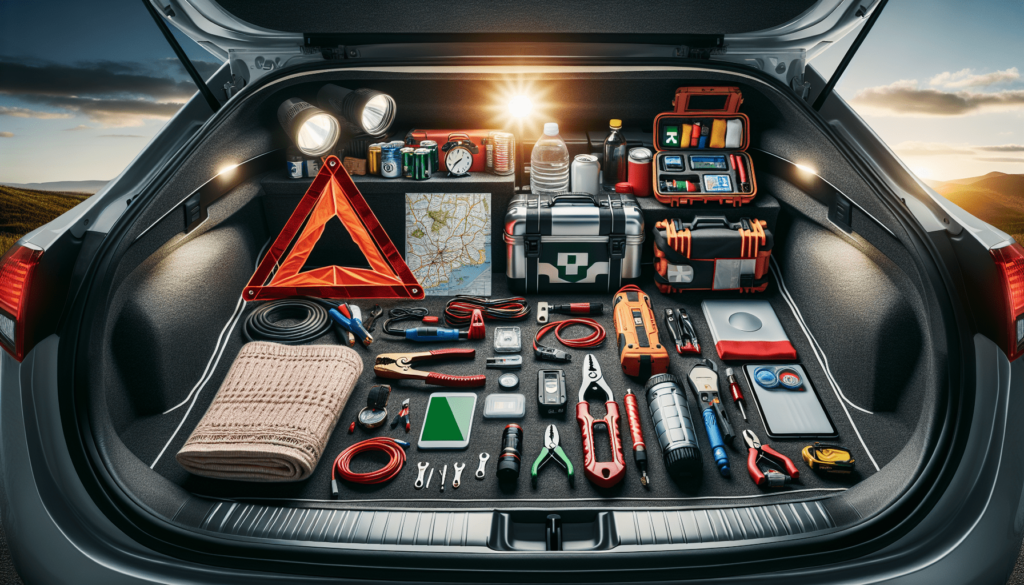
Have you ever found yourself wondering, “Am I truly prepared for any roadside mishap?” Let’s consider this together. It’s quite easy to take our daily drives for granted until suddenly faced with a flat tire on a deserted road or a dead battery miles away from any helpful soul. Being prepared isn’t just about having peace of mind; it’s about practical solutions for unforeseen situations. This is why every driver should have a set of essential items in their car at all times.
Now, it’s not about hauling around a suitcase of tools so heavy it doubles the fuel consumption. We’re talking about ten definite must-haves that are as essential as gasoline. These items don’t take much space, but their significance looms large in moments of need. So, what exactly are these lifesavers that every driver should keep nearby?

1. Spare Tire, Jack, and Lug Wrench
We’ve all heard horror stories or even experienced them ourselves—standing on the roadside with a flat tire, helplessly looking around. Having a spare tire, jack, and lug wrench isn’t just for show; they are critical to getting back on the road quickly.
The Spare Tire
A full-sized spare tire is usually the best option, but many vehicles come with compact spares. It’s important to routinely check its pressure, ensuring it’s always properly inflated. A deflated spare is just as useless as a punctured tire.
The Jack
A stable and sturdy jack is essential for lifting your vehicle safely. Practice this maneuver in your driveway to avoid any panic when you actually need to do it under pressure.
The Lug Wrench
Let’s be real; a lug wrench is the lifeline for any flat tire situation. Multi-head lug wrenches are the ideal choice, fitting various sizes of lug nuts, and making this tool an all-in-one lifesaver for our wheels.
2. Jumper Cables or Battery Booster Pack
Remember that time when your car stubbornly refused to start on a cold winter morning? That’s when jumper cables or a battery booster pack come to the rescue. These gadgets provide the emergency charge we all rely on to revive a dead battery.
Jumper Cables
A set of reliable, heavy-duty jumper cables is a classic necessity. Ensure they’re long enough to easily connect between vehicles, even in tight parking spots.
Battery Booster Pack
A battery booster pack, or jump starter, is an even more convenient alternative. Unlike jumper cables that require a second vehicle, these packs store enough power to start your car independently, letting us play superhero without needing a sidekick.
3. First Aid Kit
We all cross our fingers for safe travels, but having a first aid kit can be a game-changer in unfortunate incidents. From minor scrapes to more serious injuries, a well-equipped first aid kit is indispensable.
Contents of a First Aid Kit
Include items like adhesive bandages, antiseptic wipes, gauze pads, adhesive tape, scissors, and a CPR face shield. Over-the-counter pain relievers and gloves are also vital to handle unpredictable medical situations swiftly and safely.
4. Flashlight with Extra Batteries
Imagine trying to fix a tire in the dead of night without any illumination. A flashlight is one of those underrated tools that can prevent a frustrating situation from becoming genuinely vexing.
Choosing a Flashlight
Look for sturdy, waterproof flashlights that can withstand the elements. LED flashlights are a powerful choice due to their longevity and brightness. And let’s not forget extra batteries—a flashlight is only as good as the power source backing it up.

5. Reflective Triangles or Flares
Breaking down on a dark, bustling highway can be one of the most dangerous situations a driver faces. Reflective triangles or flares are pivotal in alerting oncoming traffic to your presence, avoiding potential accidents.
Reflective Triangles
These are easy to deploy and can be set up at different angles to enhance visibility. They’re reusable, eco-friendly, and don’t require any additional equipment.
Flares
For those preferring something more dynamic, flares offer a bright, unmistakable warning signal. Just make sure they’re stored securely to prevent accidental activation.
6. Multi-tool or Toolkit
In a world that keeps growing more complex, sometimes the simple things turn out to be most essential. A multi-tool or small toolkit is just that: a compact solution for minor repairs and adjustments on the go.
The Multi-tool
A trusty multi-tool should at least include pliers, a knife, a screwdriver, and a bottle opener (because why not?). The goal is to have a quick-fix for any minor mechanical hitch.
The Toolkit
A more comprehensive and dedicated toolkit is ideal if you have space. Wrenches, screwdrivers, and pliers are worthwhile additions for handling a broader range of situations.
7. Blanket or Warm Clothing
Whether you’re stuck in the snowy wilderness or simply in an air-conditioned rest stop longer than anticipated, a blanket or warm clothing can be your best friend. Comfort is key when you don’t have immediate control over your surroundings.
Choosing the Right Blanket
Opt for all-weather thermal blankets, which are lightweight and can retain body heat effectively. Emergency space blankets made from reflective material are an even more compact option.
8. Non-perishable Foods and Water
No one wants to think about the unpleasantness of being stranded, but having a stash of non-perishable snacks and bottled water in the car takes away some of its sting. It’s all about maintaining energy levels and hydration.
Snack Ideas
Granola bars, nuts, dried fruits, and canned goods are excellent choices. Remember to consider any dietary restrictions you may have.
Water Storage
Bottled water is crucial. In hotter climates, ensure this supply is regularly rotated to avoid contamination from prolonged heat exposure.
9. Cell Phone Charger
It’s no secret that our smartphones are practically extensions of ourselves. Having a dead phone while stuck on a lonely road is both isolating and potentially perilous.
Types of Chargers
Keep a car charger handy, as well as a portable power bank for situations where the car battery is compromised. Investing in solar-powered chargers is also worthwhile if you’re the adventurous type that ventures into places where car charging isn’t an option.
10. Emergency Contact Numbers
We carry our entire lives in our phones, but what if technology fails us? Keep a hard copy of essential phone numbers, such as roadside assistance, medical services, and personal contacts in your glove compartment.
Organizing Contact Information
Print or write down these numbers and store them in a weatherproof pouch. It’s a simple fallback plan that can save significant stress during dire situations.
Feel like you already knew some of these essentials? Maybe there are a few items that were completely off your radar. Remember, the goal is to create a car emergency kit that suits our personal needs and gives us that invaluable peace of mind.
With a little bit of preparation, we’re better equipped to handle breakdowns, weather-related issues, and even minor accidents. So, the next time we hit the road, we can truly embrace the journey knowing we’re ready for whatever lies ahead. Traveling Smartly and safely is within reach—it’s all a matter of being proactive.
